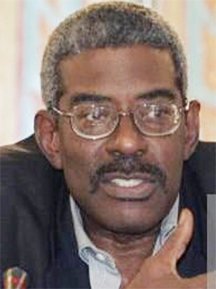Hugh Cholmondeley, pioneer broadcaster and international public servant lost his battle against cancer last Friday at the New York University Hospital. He was 73 years old.
He had a long career here as a broadcaster and worked with several international organizations in conflict resolution and other areas.

The late broadcaster’s daughter, Alliance for Change Member of Parliament, Cathy Hughes listed her father‘s myriad skills as being brought to bear in the areas of “peace-building, disaster response, reconciliation and recovery in war-torn countries; programme and project design, formulation and management; strategic planning for governments, businesses, public utilities, bilateral and multilateral agencies; communications, development, elections, democratization, governance and related public policy issues; and adviser on the establishment, reform, merger, acquisition and operation of mass media organizations.”
His interests, she said, included research, writing, attending and lecturing at local, regional and international conferences, symposia, workshops and seminars on various aspects of national and international responses to conflict, crises and natural disasters; the implications of globalization; information and communications for development; reading, listening to music and playing tennis, among others.
Yesterday tributes flowed in from his friends, former colleagues, politicians and others who admired his contributions in both the local, regional and international arenas.
“Hugh didn’t limit his scope to Guyana. He always had a vision for regional integration. He went into other territories, he made friends and so and we established systems which resulted in the Caribbean Broadcasting Union Cana and Carimac…” said former General Manager of the then Guyana Broadcasting Corporation (GBC) and former Deputy General Manager of the Guyana Telephone and Telephone Company Terry Holder.
Holder who remained close friends with Cholmondeley from their days in Comenius Moravian elementary school, fondly reminisced on a “buddy’ who also shared his high school days at Queen’s College with him, and then also joined the Guyana Broadcasting Corporation (GBC) where they played major roles in local radio programming.
He told Stabroek News in an interview yesterday that the news of the death of his long-time friend came as a blow since their last meeting a few months ago was one filled with laughter, fun and nostalgic moments. “Our friend Vic Insanally three to four months ago invited us …you know us all being over three score and ten had a discussion on a series of topics, one being our sicknesses, ailments and treatments,” he chuckled; “He was in a good mood; we knew he was ill and was undergoing treatment, but he had become accustomed to it and I thought it was just a matter of time before he completed all and returned to Guyana for us to continue.”
Holder said that post-independent Guyana saw Cholmondeley being made General Manager of the Guyana Broadcasting Service and being instrumental in changing the station and giving it a human touch. “We were moving from a stage where broadcasters talked to people to what Hugh said should be broadcasters talking with people,” he said, using the first call-in programme, ‘Action Line’ as an example of the revolutionary stance Cholmondeley took.
Giving an insight into the work schedule of his friend, he continued: “Hugh did the leg work, working tirelessly and always optimistic …getting everything up, going here, meeting there, and you had the Caribbean News Agency…“I am very sorry and saddened he is gone too soon for he had so more to give.”
A Partnership for National Unity’s Vice-Chairman Dr Rupert Roopnaraine said it has been a privilege to know Chomondelely, and that Guyana had lost a valuable son.
Roopnaraine echoed similar sentiments in relation to Cholmondeley’s broadcasting career, saying that he had succeeded in promoting patriotism without sacrificing professionalism.
He went on to recall Chomondelely’s pivotal role in facilitating negotiations for the 1998 Herdmanston Accord following unrest in the city in the wake of the 1997 General and Regional Elections.
“What I recall most in him,” he said, “was his passionate commitment to finding national consensus on our most pressing problems.”
In the diplomatic field, Cholmondeley contributed his expertise in a number of post-disaster situations such as Somalia where he worked for the United Nations, in Jamaica following hurricane devastation and in Guyana after the 2005 flood with the Guyana Citizens Initiative.
Meanwhile the Government of Guyana, the Guyana Press Association (GPA) and the Working People’s Alliance (WPA) released tributes and expressions of sympathy on Chomondeley’s passing.
“Hugh Cholmondeley’s contributions to the development of broadcasting in Guyana and the wider Caribbean and his astute diplomatic skills which he deployed globally are great losses.
We salute his contributions to nation building, his professionalism and his unique intellect which were brought to bear on all aspects of his public service,” the government said in a statement last evening.
“His contribution to the world of broadcasting in the region has been legendary, and his indefatigable work in the United Nations system has been exemplary” said the GPA.
The local press association went on to say that they were both happy and proud of Cholmondeley‘s interest in the development and growth of the media and his visionary initiatives’ which earned him a place in the CBU’s hall of heroes.”
“Hugh Cholmondeley brought class, finesse, and pizzazz to post Independence radio and latterly Television Broadcasting in the Commonwealth Caribbean. He was a pioneer in sharing and executing regional radio and television programming and broadcasting” the statement said.
“Guyana has lost one of most accomplished public servants whose skills and advice in several areas of public policy will be severely missed.
Although he has been ailing in recent times his death still comes as a shock” the WPA said. “Brother Hugh was a committed advocate of National Reconciliation and Ethnic Unity and worked tirelessly, mostly behind the scenes, to advance the process.
He was appointed by Caricom to act as facilitator in the negotiations that resulted in the Herdmanston Accord of 1998 and devoted much of his time and energy in pursuit of that national solution that continues to elude us.”




